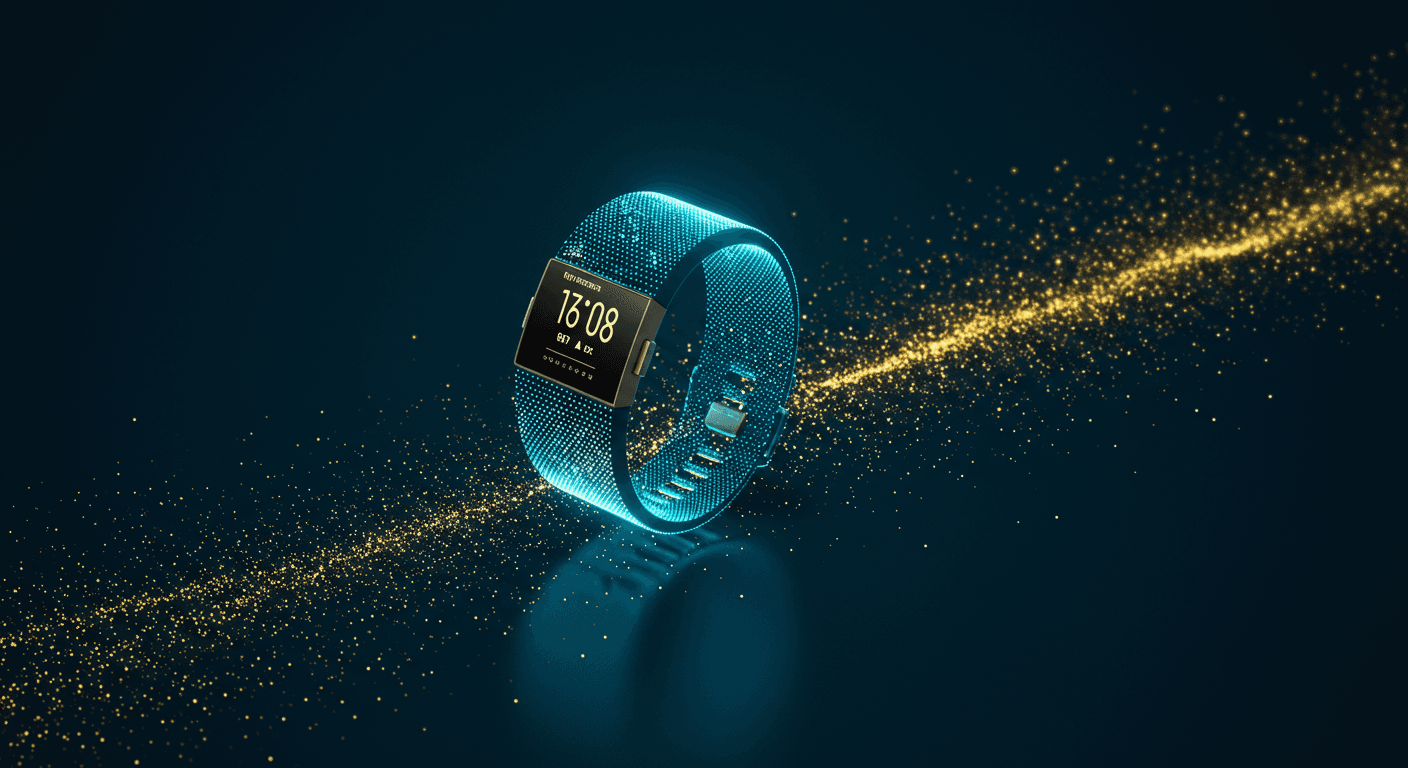Fitbit's AI Health Coach: How Personalized Insights Are Revolutionizing Fitness

Fitbit's journey from step trackers to personalized AI health coaches marks a seismic shift in preventative healthcare.
From Steps to Insights: The Fitbit Evolution
Remember when Fitbit was just counting steps? It's evolved, alright! Now, it's about understanding the why behind the data, not just the what.
"It's like having a pocket-sized Sherlock Holmes dedicated to your well-being."
AI-Powered Personalization
The real game-changer is the move from reactive data collection to proactive, personalized guidance. Instead of simply showing you your stats, Fitbit's AI can:
- Analyze trends: Spotting patterns you might miss, like sleep disruptions linked to certain activities.
- Provide motivating nudges: Gentle reminders and encouragement to keep you on track with your goals.
The Future of Preventative Care
This isn't just about fitness; it's about revolutionizing preventative healthcare. AI-powered wearables can help individuals:
- Identify potential health risks early: Spotting subtle changes in heart rate variability that could indicate a problem.
- Manage chronic conditions more effectively: Providing personalized support for diabetes, hypertension, and more.
- Empower individuals to take control of their health: Giving them the tools and knowledge to make informed decisions.
Unpacking the AI: How Fitbit's Algorithms Are Reshaping Health Insights
Fitbit's move beyond basic step tracking hinges on a suite of sophisticated AI algorithms that interpret your body's data in truly personalized ways.
The Algorithmic Arsenal
Fitbit isn’t just counting steps anymore. Under the hood, it's wielding:Machine Learning (ML): For pattern recognition. Think of it as teaching the AI to recognize your* unique sleep cycles based on heart rate variability and movement.
- Deep Learning (DL): For more complex tasks like predicting stress levels from subtle changes in your heart rate and activity patterns. Deep learning can understand highly intricate data relationships to solve real-world problems.
- Predictive Analytics: Uses historical data to forecast future trends. For example, anticipating periods of increased stress based on your past behavior and sleep patterns.
Data Ingestion and Processing
Fitbit's algorithms gobble up data points including:- Activity levels (steps, exercise intensity).
- Sleep patterns (duration, stages, restlessness).
- Heart rate (resting, active, variability).
- Dietary logs (if you use the app).
AI Insights vs. Standard Metrics
Forget just knowing how many steps you took. The AI provides actionable insights:- Stress Management: Instead of just telling you your heart rate was elevated, Fitbit can flag periods of high stress and suggest breathing exercises.
- Personalized Recommendations: Fitness AI suggests workouts based on your current fitness level and goals.
AI is no longer a futuristic fantasy, but a present-day partner in achieving your fitness aspirations.
Beyond the Numbers: AI-Driven Personalized Coaching and Recommendations
Fitbit's AI Health Coach takes the raw data from your wearable and transforms it into actionable insights, creating highly tailored fitness plans based on your unique physiology, activity levels, and sleep patterns. Think of it as having a highly trained personal trainer and nutritionist constantly analyzing your stats and adjusting your regimen for optimal results. Fitbit hasn't been indexed on our platform, but this tool can be a game changer.
Adaptability is Key
One of the AI's most impressive features is its ability to adapt to your changing needs and goals.
- Injury Recovery: The AI can modify your plan to focus on low-impact exercises and rehabilitation routines.
- Marathon Training: It can progressively increase mileage and intensity, optimizing your performance while minimizing the risk of overtraining.
- Life Changes: It adapts to major life changes, such as adjusting exercise routines during pregnancy.
Holistic Wellness Guidance

The AI goes beyond just workouts, offering personalized recommendations for nutrition, sleep, and even stress management, crucial for overall fitness and wellbeing. This creates a complete holistic approach to health, using AI to analyze your body and offer advice beyond pure physical activity.
- Nutritional Recommendations: Tailored meal plans based on your caloric needs, dietary preferences, and workout intensity.
- Sleep Optimization: Advice on improving sleep quality, including bedtime routines, sleep schedules, and relaxation techniques.
- Stress Management: Recommendations for mindfulness exercises, meditation, and other stress-reducing activities.
Even if you're not consciously tracking it, your Fitbit is crunching data to guide you toward a healthier lifestyle. But where does the AI truly shine: the free app, or the Premium subscription?
AI on a Budget: Free vs. Premium
The free version of the Fitbit app offers baseline insights driven by basic algorithms. Think step counts, sleep duration, and activity tracking. While helpful, these insights are fairly generic."The free Fitbit experience is like having a map of the world, but without street names or points of interest."
Fitbit Premium (Fitbit) unlocks the full potential. The AI goes deeper, analyzing your unique patterns to offer personalized guidance. Here's the breakdown:
- Personalized Insights: Premium analyzes trends to provide tailored advice on sleep, activity, and nutrition.
- Advanced Sleep Analysis: Goes beyond duration to identify sleep stages and restlessness, suggesting actionable improvements.
- Stress Management: Provides a Stress Management Score and guided relaxation exercises based on your heart rate variability.
- Guided Programs: Access to structured workout and nutrition plans.
Is 'Fitbit Premium AI Features Cost' Worth It?
The answer depends on your needs. If you're happy with basic tracking, the free version suffices. However, if you're seeking genuinely personalized, AI-driven insights and guidance to optimize your fitness journey, Premium is likely worth the investment. Consider it a personal AI health coach.Depth & Quality of AI Insights
Free insights are descriptive; Premium insights are prescriptive. Free tells you what happened; Premium tells you why and how to improve. The difference lies in the sophistication of the AI algorithms and the data they analyze.Ultimately, comparing the two versions highlights the value proposition: are personalized insights worth the price of admission? For those seeking more than just raw data, the answer is often a resounding yes.
It's not just about counting steps; it's about understanding why you're taking them, and Fitbit's AI Health Coach promises precisely that.
Real-World Results: User Experiences with Fitbit's AI Health Coach
Fitbit's integration of AI aims to provide hyper-personalized fitness guidance, but does it deliver? Let's dive into what users are actually saying.
- Weight Loss Success Stories: Many users report significant weight loss, attributing it to the AI's tailored calorie recommendations and exercise suggestions. One user, Sarah, shared, "The AI told me to swap my sugary afternoon snack for a protein bar, and I've lost 15 pounds in two months!"
- Improved Sleep Quality: Testimonials frequently mention improved sleep patterns thanks to the AI's analysis of sleep data and personalized recommendations. "I used to toss and turn all night," says Mark. "Now, the AI suggests a guided meditation before bed, and I'm sleeping like a log." This is similar to how AI is used in Design AI Tools -- providing better UX through customization.
- Motivation and Engagement: The AI acts as a virtual cheerleader, offering encouragement and adapting the program based on progress. "It's like having a personal trainer in my pocket!" exclaims Emily. "The AI keeps me motivated even when I want to skip a workout."
Potential Drawbacks
Of course, no system is perfect:
- Data Privacy Concerns: Some users have expressed concerns about the amount of personal data collected and analyzed by the AI.
- Inaccurate Readings: Occasional inaccuracies in data collection, such as step counts or heart rate monitoring, can skew the AI's recommendations.
- Over-Reliance: Users must be wary of becoming overly dependent on the AI, potentially ignoring their own body signals or intuition. This underscores the need for a balanced approach.
Here's how data privacy impacts your fitness routine.
Privacy and Ethics: Navigating the Data Minefield of AI Health Tracking
Data from AI-powered health trackers like the Fitbit's AI Health Coach offers personalized insights, but it also raises significant Fitbit AI privacy concerns. Let’s unpack how these tools collect, use, and protect your data.
Data Handling Practices
Fitbit Fitbit collects a vast amount of personal data: activity levels, sleep patterns, heart rate, and even location. This data is used to personalize your fitness experience, offering tailored workout recommendations and health insights. It’s crucial to understand how Fitbit handles this sensitive information.Fitbit states that it employs industry-standard security measures to protect user data. However, no system is foolproof, and data breaches can happen.
- User Control: Fitbit provides options to control what data is collected and shared. Users can adjust privacy settings to limit data collection, but this may also affect the accuracy and personalization of the AI Health Coach’s recommendations.
- Data Anonymization: Fitbit anonymizes some data for research purposes. However, anonymized data can sometimes be re-identified, blurring the lines of privacy.
- Third-Party Sharing: Be cautious about third-party apps that integrate with Fitbit. Always review their privacy policies to understand how they might use your data.
Ethical Implications

Using AI to make health-related decisions comes with ethical considerations:
- Algorithmic Bias: AI algorithms are trained on data, and if that data is biased, the AI can perpetuate inequalities. For example, a fitness tracker might not accurately assess the health of individuals from underrepresented groups.
- Data Security: Your health data is valuable, and the risk of it falling into the wrong hands is a real concern. Reviewing the Legal agreements of any service is critical.
- Autonomy: Relying too heavily on AI for health decisions can erode your personal autonomy. The goal is to enhance your health journey, not dictate it. Check out these Software Developer Tools that provide control and customization in your wellness journey.
It's not sci-fi anymore; AI is poised to supercharge your Fitbit experience and redefine personalized health.
Predictive Health Alerts
Imagine if your Fitbit could anticipate health risks before you even feel them.- AI could analyze sleep patterns, activity levels, and even subtle changes in heart rate variability to predict potential issues like the onset of a cold or early signs of overtraining.
- Think of it as a proactive health advisor, offering tailored recommendations to prevent problems before they escalate.
AI-Powered Mental Wellness
Fitbit's future isn't just about physical health; AI can bring nuanced mental health support.- Imagine a Fitbit app that analyzes your activity and sleep data alongside self-reported mood logs. The AI could then suggest tailored mindfulness exercises, breathing techniques, or even connect you with mental health resources through integrations with platforms like abby - your AI therapist.
- > The goal? To offer personalized support that adapts to your individual needs and rhythms.
Seamless Healthcare Integration
The real game-changer lies in connecting your Fitbit data with your broader healthcare ecosystem.- AI could facilitate secure data sharing with your doctor, providing them with a more holistic view of your health. This could lead to earlier diagnoses, more effective treatment plans, and better overall health outcomes.
- By integrating with platforms like CarePatron, a HIPAA compliant practice management software, Fitbit could facilitate smoother communication between patients and healthcare providers, making healthcare more proactive and preventative.
Keywords
Fitbit AI, AI health coach, Fitbit personalized health, Fitbit app AI features, wearable AI, AI fitness tracking, Fitbit health insights, personalized fitness plans AI, AI driven wellness, Fitbit premium AI, future of Fitbit
Hashtags
#FitbitAI #HealthTech #AIHealthCoach #WearableTech #PersonalizedHealth
Recommended AI tools
ChatGPT
Conversational AI
AI research, productivity, and conversation—smarter thinking, deeper insights.
Sora
Video Generation
Create stunning, realistic videos & audio from text, images, or video—remix and collaborate with Sora 2, OpenAI’s advanced generative app.
Google Gemini
Conversational AI
Your everyday Google AI assistant for creativity, research, and productivity
Perplexity
Search & Discovery
Clear answers from reliable sources, powered by AI.
Cursor
Code Assistance
The AI code editor that understands your entire codebase
DeepSeek
Conversational AI
Efficient open-weight AI models for advanced reasoning and research
About the Author

Written by
Dr. William Bobos
Dr. William Bobos (known as 'Dr. Bob') is a long-time AI expert focused on practical evaluations of AI tools and frameworks. He frequently tests new releases, reads academic papers, and tracks industry news to translate breakthroughs into real-world use. At Best AI Tools, he curates clear, actionable insights for builders, researchers, and decision-makers.
More from Dr.Was this article helpful?
Found outdated info or have suggestions? Let us know!


